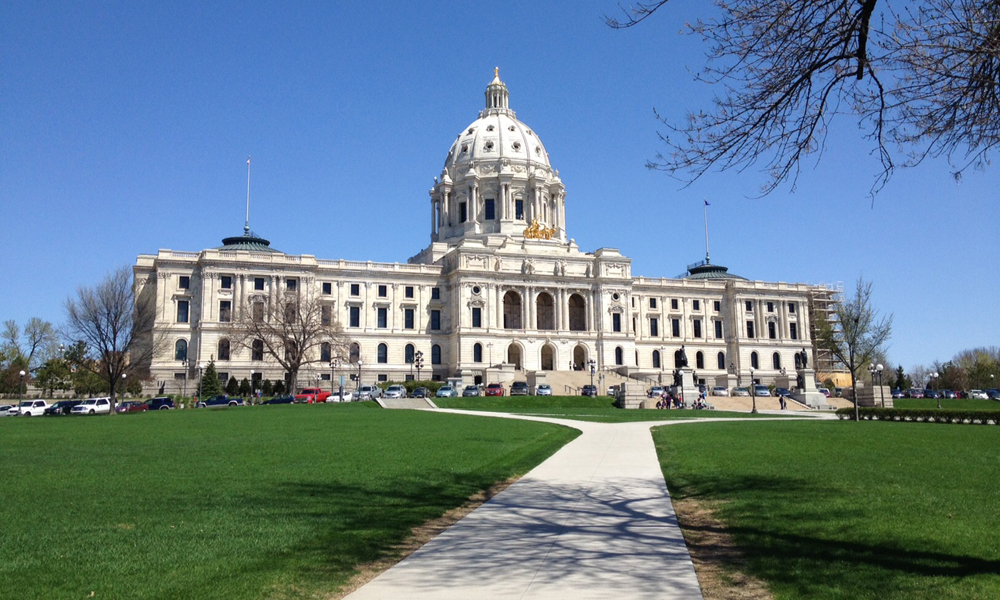2020 Minnesota Legislative Preview: Electric Vehicles
January 15, 2020 | Brendan Jordan | Policy

Minnesota’s legislative session is right around the corner and Drive Electric Minnesota is ready to continue our support of a policy and regulatory landscape that drives electric vehicle (EV) adoption and infrastructure. With that, I want to share Drive Electric Minnesota’s policy and regulatory positions for 2020 and some quick thoughts about how accomplishments in 2019 set the stage for this year.
Some progress was made in the 2019 session, most notably the prevention of a dedicated EV tax which could have raised the current $75 tax to as much as $250; an unfair move that would have made EV-owning taxpayers pay thousands of dollars more over time in gas taxes and other highway taxes than owners of equivalent gasoline cars. Also in 2019, legislators on both sides of the political aisle put forward proactive legislation to promote EVs. This resulted in the ultimate passage in the House of omnibus bills that included some of the positive provisions, which shows there is growing support for EVs even though the provisions did not pass both chambers. You can read our complete recap of the 2019 session here.
Looking ahead to the 2020 session, I’d like to thank Drive Electric’s policy committee for its work to advocate for policies and administrative actions to jump-start Minnesota’s EV market. The policy statements below reflect the direction of the coalition for the 2020 legislative session and are supported by the following members:
|
|
|
|
|
|
|
|
|
|
|
|
|
|
|
|
|
|
2020 Policy and Regulatory Positions for Increasing Electric Vehicle Adoption in MN
Legislative Actions:
Offer EV purchase incentive
A challenge in encouraging EV adoption is higher purchase price, despite much lower fuel and maintenance costs. Recognizing the economic, energy security, and environmental benefits of EVs, 20 states are advancing sales through financial incentives. These include tax credits, sales tax relief, or rebates. Studies of similar policies in other states make clear that this approach is effective in increasing EV sales. Drive Electric Minnesota supports a Minnesota state rebate program and other financial incentives to catalyze increased sales and supports phase-out once the technology matures and upfront costs come down.
Encourage EV program investment by investor-owned electric utilities
Electric utilities can support increased adoption and beneficial integration of EVs into the electric system to benefit their customers. Several studies demonstrate that public charging infrastructure availability can accelerate adoption of EVs. Utilities, in partnership with charging companies, state and federal government, and other partners, can work to close the infrastructure gap. They are a trusted source of information about charging solution choices, have established relationships with their customers, and can communicate and educate on the benefits of EVs. Drive Electric Minnesota supports legislation making clear that investment by investor-owned electric utilities, along with continued private investment in EV charging infrastructure and promotion, benefits vehicle owners and utility customers.
Fair EV tax
According to analysis by the Great Plains Institute, EV drivers contribute more to the Highway User Tax Distribution Fund than drivers of equivalent gasoline-powered vehicles through higher motor vehicle sales tax and tab fees based on the currently higher up-front cost of EVs. Furthermore, any EV tax should reflect, like the gas tax, the higher fuel efficiency of EVs. Over-taxing EVs today will discourage adoption and slow the development of this new market. Drive Electric Minnesota supports a delayed implementation of EV taxes until EVs reach price-parity with gasoline vehicles (2025-2030) and calculation of a fair EV tax that takes into account the fuel efficiency of EVs.
Administrative Actions:
EVs in state fleets
EVs make economic sense for fleets through reduced fuel and maintenance costs over the life of a vehicle and will help to meet state goals. Minnesota has a goal, established through executive order, of a 30 percent reduction in state fleet consumption of fossil fuels, and 20 percent of state vehicles EV, by 2027. By purchasing EVs for fleets, state and local governments can move the needle toward accomplishing these goals. Additionally, having EVs on the state contract also has benefits beyond state government by supporting the availability of EVs at more dealerships and making it easier for local governments to procure EVs. Drive Electric Minnesota supports the adoption of EVs by state and local government fleets and the efforts of state agencies to continue working toward achieving state goals.
Electric transit buses
Metro Transit has committed to increasing the adoption of electric buses and has already purchased electric buses for one bus line. New Flyer manufactures electric buses in St. Cloud and Crookston and employs nearly 1,200 Minnesotans. Electric buses can benefit communities throughout the state through lower emissions, improved air quality, and manufacturing jobs. Drive Electric Minnesota supports increased purchasing of electric buses for transit statewide and increased electric bus manufacturing in the state.
EV infrastructure
The Minnesota Pollution Control Agency has made strong commitments to invest funding from Appendix D of the Volkswagen Settlement to increase public EV charging stations in the state. Drive Electric Minnesota supports investment by the state, through the VW settlement and other sources, in making public EV charging stations available to all Minnesotans.
Regional collaboration on EV corridors
To assist in increasing the adoption of EVs in the state and providing convenient travel to neighboring states, Drive Electric Minnesota recognizes the critical roles that completing EV corridors can play in enabling travel throughout the region and beyond Minnesota’s borders. Drive Electric Minnesota supports efforts of the state to collaborate with other Midwestern states on building out and supporting EV charging corridors.
We look forward to working on these issues and to a productive 2020 legislative session in Minnesota.
You can keep up-to-date on all Drive Electric Minnesota news by signing up for our newsletter and following us on Facebook and Twitter.
